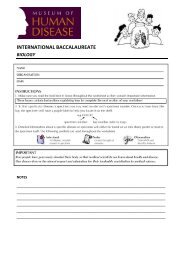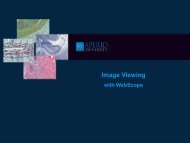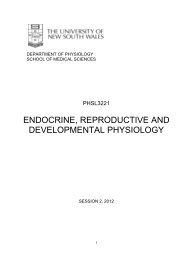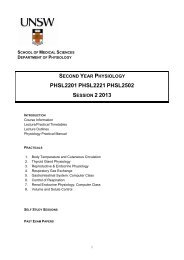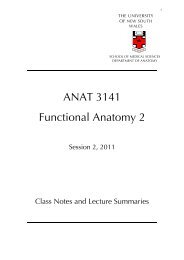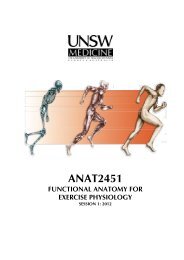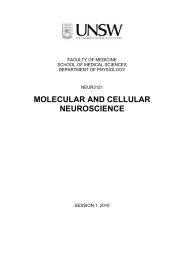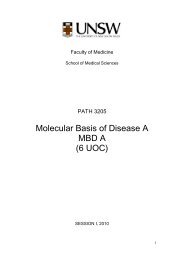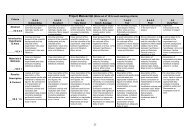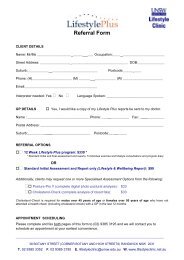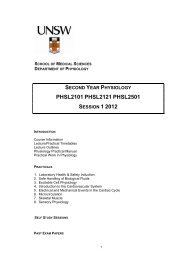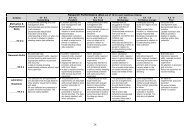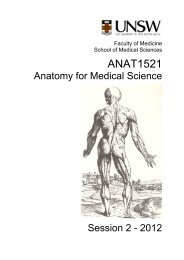PHSL2201 PHSL2221 PHSL2502 - School of Medical Sciences
PHSL2201 PHSL2221 PHSL2502 - School of Medical Sciences
PHSL2201 PHSL2221 PHSL2502 - School of Medical Sciences
Create successful ePaper yourself
Turn your PDF publications into a flip-book with our unique Google optimized e-Paper software.
• unacknowledged use <strong>of</strong> information or ideas, unless such information or ideas<br />
are commonplace.<br />
• citing sources (e.g. texts) which you have not read, without acknowledging the<br />
'secondary' source from which knowledge <strong>of</strong> them has been obtained.<br />
Appropriate citation <strong>of</strong> sources therefore includes surrounding any directly quoted text<br />
with quotation marks, with block indentation for larger segments <strong>of</strong> directly-quoted text.<br />
The preferred format for citation <strong>of</strong> references is an author-date format with an<br />
alphabetically arranged bibliography at the end <strong>of</strong> the assignment. Note that merely<br />
citing textbooks or website URLs is unlikely to yield a bibliography <strong>of</strong> satisfactory<br />
standard. The internet should be avoided as a primary source <strong>of</strong> information. Inclusion<br />
<strong>of</strong> appropriate journal articles, both primary research publications and reviews, is usually<br />
expected.<br />
The inclusion <strong>of</strong> the thoughts or work <strong>of</strong> another with attribution appropriate to the<br />
academic discipline does not amount to plagiarism.<br />
Students are reminded <strong>of</strong> their Rights and Responsibilities in respect <strong>of</strong> plagiarism, as<br />
set out in the University Undergraduate and Postgraduate Handbooks, and are<br />
encouraged to seek advice from academic staff whenever necessary to ensure they<br />
avoid plagiarism in all its forms.<br />
The Learning Centre website is the central University online resource for staff and<br />
student information on plagiarism and academic honesty. It can be located at:<br />
www.lc.unsw.edu.au/plagiarism<br />
The Learning Centre also provides substantial educational written materials, workshops,<br />
and tutorials to aid students, for example, in:<br />
• correct referencing practices;<br />
• paraphrasing, summarising, essay writing, and time management;<br />
• appropriate use <strong>of</strong>, and attribution for, a range <strong>of</strong> materials including text, images,<br />
formulae and concepts.<br />
Individual assistance is available on request from The Learning Centre.<br />
Students are also reminded that careful time management is an important part <strong>of</strong> study<br />
and one <strong>of</strong> the identified causes <strong>of</strong> plagiarism is poor time management. Students<br />
should allow sufficient time for research, drafting, and the proper referencing <strong>of</strong> sources<br />
in preparing all assessment items.<br />
* Based on that proposed to the University <strong>of</strong> Newcastle by the St James Ethics Centre. Used with kind permission from<br />
the University <strong>of</strong> Newcastle.<br />
† Adapted with kind permission from the University <strong>of</strong> Melbourne.<br />
GUIDELINES ON EXTRA-CURRICULAR ACTIVITIES AFFECTING ATTENDANCE<br />
Students should refer to the following website for information relating to extracurricular<br />
activities.<br />
http://medicalsciences.med.unsw.edu.au/SOMSWeb.nsf/resources/Course+Outline+NE<br />
UR+2/$file/Extra-curricularActivitiesSOMS.pdf<br />
13



